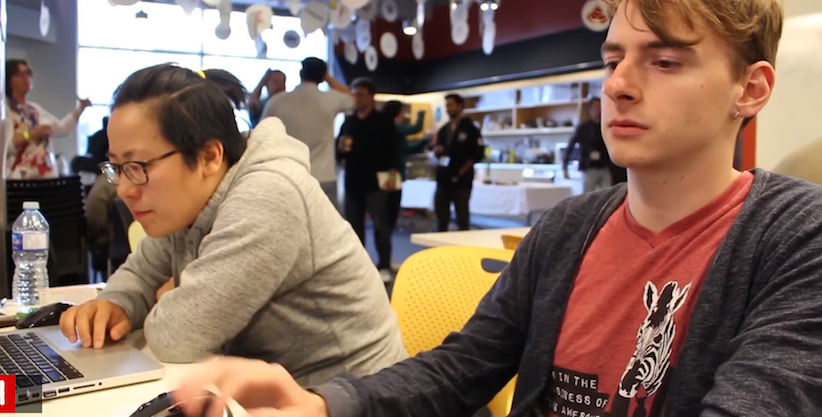Facebook invites tech nerds to hack dementia
Jordan Banks and Shaharris Beh consider the possibilities of HackerNest
Share
Imagine if a person with dementia could tap a device on a television, microwave or laundry machine and instantly be reminded how to use it. Technologies like this emerged from last year’s DementiaHack, a “hackathon” that incubates hundreds of tech and medical professionals, along with the general public, to create tools for people living with dementia—a condition experienced by about 750,000 Canadians and 15 per cent of Canadians aged 65 and older.
The event, held this year at Toronto’s George Brown College on Nov. 7- 8, is organized by Facebook Canada and HackerNest, a not-for-profit aimed at using technology for economic development. This weekend, as early registrants began dividing into teams and pitching ideas, Maclean’s spoke with Jordan Banks, managing director of Facebook Canada, and Shaharris Beh, director of HackerNest.
Q. What is a “hackathon”?
Shaharris Beh: It’s a coding competition where nerds get together, sit together for 24, 36, 48 hours and work on cobbling together solutions. You’re forced to work fast, so it cuts out a lot of the fat.
Jordan Banks: They’re hugely productive. Many of Facebook’s features have come out of hackathons—our newsfeed, some of our birthday functionality.
Q. Why the focus on dementia?
Shaharris Beh: The British government came to HackerNest last year. They said one of our Millenium Development Goals is to tackle dementia. They saw it affecting millions of people and came to us. [The U.K. government sponsors the event.] The vast majority of hackathons are full of Red Bull and pizza, but this one is all about coming up with solutions and getting them into the hands of people who need them.
Jordan Banks: I’ve had five grandparents who have had Alzheimer’s. I’ve been involved in raising money for two decades, so I thought, how could I combine my work with this commitment to helping dementia? One of the myths is that it’s an older person’s disease. We’re seeing early onset dementia among people at 45. It’s not just the disease of the 70- or 80-year-old. It’s the disease of everybody.
Q. How will DementiaHack work?
Shaharris Beh: We have been advised on the acute areas of need. People have come and said, “If you do this, it will make our lives better.” There are four key areas: the inpatient, the family caregiver, who often feels isolated, the institutional caregiver, and researchers. Researchers are dealing with datasets so vast and diverse, they need help figuring out how to get their heads around them. We have a series of team-matching sessions before November. It’s free—we ask for $42 ahead of time, but when they show up to the event, we give the money back. We want to reward people for doing the work. We’re even providing daycare.
Jordan Banks: We stay up for 30 hours straight—that’s very fun. For most hackathons, 90 per cent of people sign up in the week before the hackathon. We’re a month out and already have half[(150 registrants]. That’s unheard of. It’s a real indication that young people are not going to let [dementia] ravage our parents and our grandparents.
Q. One of the main symptoms of dementia is impaired judgment. Given that Facebook documents a person’s online comments and activity, should people with dementia use Facebook at all?
Jordan Banks: There are myriad decisions to be made: should they drive? We’re thinking about how we can use Facebook as an early indicator. Family and friends can see how, for example, the person is talking about a journey they didn’t go on or having lunch with a friend they didn’t have lunch with. Can we use those as early alerts that maybe the person should see a doctor? The most important thing is early diagnosis.
Q. DementiaHack is focused on creating tools for people to cope with symptoms, but could hackathons help us find a cure?
Jordan Banks: There will be many cases when researchers will need to look at data to come closer to a cure, in maybe five years, 10 years, 15 years. We can help make that data analysis easier. We can’t let this wait. Dementia has potential to cripple our economy.
Shaharris Beh: We want to make sure that, coming out of this hackathon, we have immediate tools people can use. At a hackathon, you get to create something from start to finish. That is a beautiful thing.
